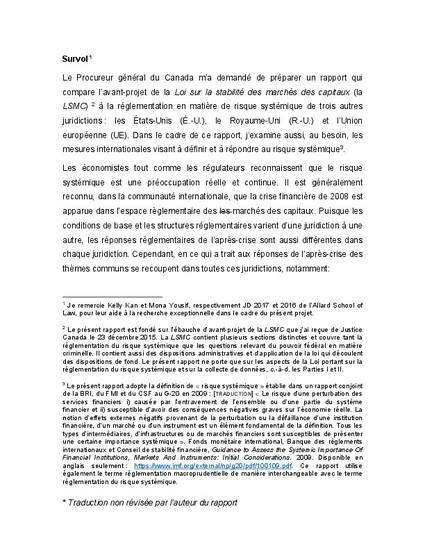
- Systemic Risk; Systemic Importance; System Effects; Financial Innovation; Securities Regulation; Capital Markets; Data Collection; Financial Benchmarks; Canada; United States; Dodd-Frank; European Union; European System of Financial Supervision; United Kingdom; Bank of England; Benchmarks; SIFI
This report succinctly compares, with tables and diagrams, the systemic risk regulatory regimes that have been put in place since 2008 in the US, the UK, the EU and Canada. It describes systemic risk as a problem of a different order from the kinds of investor protection and efficient market concerns that animate day-to-day securities and capital markets regulation. Because contemporary markets operate as systems, characterized by interconnectedness, unpredictability, and fast-moving, multiple-round contagion effects, responding to systemic risk demands a different regulatory structure and a separate set of tools. This report was prepared for the Department of Finance, Government of Canada in response to a constitutional challenge by Quebec to proposed federal legislation, the Capital Markets Stability Act, which would put in place a systemic risk regulatory regime with oversight over Canadian capital markets. It compares existing provincial securities regulatory regimes with the proposed regime, and with international standards and transnational regulatory structures. For non-Canadians, apart from the summaries above, the most interesting point may be that the proposed Canadian regime is structured to designate and regulate as systemically risky or important only benchmarks, products, and practices ― not institutions, no matter how large, nor financial market infrastructure, no matter how essential. This approach arguably covers the same ground but is more in line with the growing recognition that systemic risk operates primarily at the level of markets and products, not institutions. It would also avoid the need to designate institutions as too big to fail, e.g., under Dodd-Frank, or to designate investment funds (as opposed to the products they sell) as systemically important.
